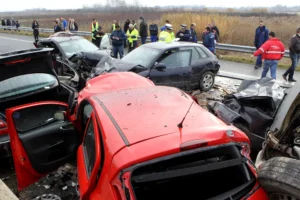Can Multiple Parties Be Liable for a Car Accident?~3 min read
The easy answer to the question, “Can multiple parties be liable for a car accident?” is “Yes.” First, all drivers involved in a car accident may be at fault to some degree. For example, the person driving in front of you may have stopped abruptly causing you to hit them from behind.

Often, it is assumed the person in the rear is at fault for not stopping in time, but if you were following too close or distracted by texting or talking or picking something up off the floor, you may also be held liable for the accident.
Under the legal theory of vicarious liability, another person, corporation, business owner, or employer may be held liable for the accident when that person, corporation, business owner, or employer was nowhere near the scene of the accident. This usually occurs when the driver was in the course and scope of employment at the time of the wreck.
Vicarious Liability Defined
Vicarious liability and negligent entrustment apply when, due to a special relationship, one person is held liable for the negligent acts of another. One example is when parents give their unlicensed or reckless child permission to drive their car and the child’s negligence results in an accident. The parents may be held liable for their child’s negligence.
The most common example of vicarious falls under the legal doctrine of respondeat superior.
Respondeat Superior: When Employers are Vicariously Liable for the Negligence Acts of Their Employees
Under the age-old legal doctrine of respondeat superior, employers may be vicariously liable for the negligent acts of their employee when the employee’s actions are within the scope of employment. This often applies, for example, when a truck driver is involved in an accident while transporting goods on behalf of a trucking company. The employer/trucking company may also be held liable for the accident.
In order to collect under respondeat superior, you must prove:
- The employee’s negligence caused the car accident.
- The employee was driving at the bequest of the employer at the time of the car accident.
- The employee was driving within the scope of their employment.
When all these elements are met, the employer may be held liable for the car accident. Often, the employer will try to claim the driver was not driving within the scope of their employment. One example of this is when the driver of the car is on an errand for the employer but interrupts that errand by doing something for themselves, such as stopping at the grocery store, and the accident happens when they are headed to or from the grocery store.
Springer & Lyle Can Help
The personal injury attorneys at Springer & Lyle are experienced with helping you get the reasonable compensation you are entitled for your injuries, lost wages, medical expenses, pain and suffering, and other physical damage under the theory of vicarious liability. Contact us online or call 940-370-4033 to schedule a free consultation.





